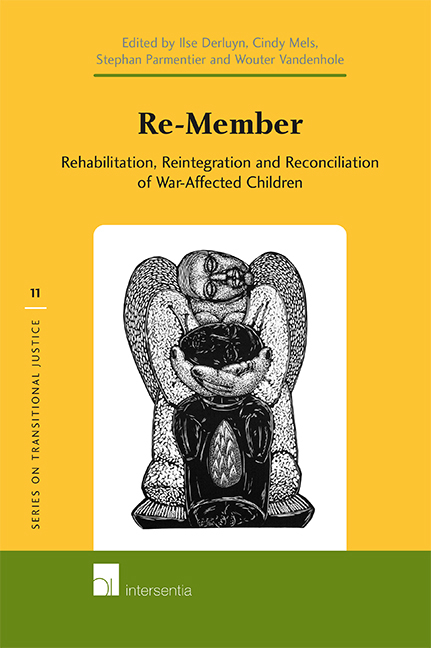Book contents
- Frontmatter
- Preface
- Foreword
- Contents
- Introduction: Children Affected by Armed Conflict at the Intersection of Three Fields of Study
- PART I SETTING THE SCENE: THREE DISCIPLINARY PERSPECTIVES
- PART II LESSONS LEARNT FROM CURRENT PRACTICES AND APPROACHES
- PART III EXPLORING RESOURCES THROUGH EMPIRICAL RESEARCH
- PART IV LOOKING BACK, REACHING FORWARD
- About the Editors
- About the Authors
4 - And the Children Learned Not to Cry: Stories About Children and Transitional Justice in Latin America
Published online by Cambridge University Press: 20 January 2021
- Frontmatter
- Preface
- Foreword
- Contents
- Introduction: Children Affected by Armed Conflict at the Intersection of Three Fields of Study
- PART I SETTING THE SCENE: THREE DISCIPLINARY PERSPECTIVES
- PART II LESSONS LEARNT FROM CURRENT PRACTICES AND APPROACHES
- PART III EXPLORING RESOURCES THROUGH EMPIRICAL RESEARCH
- PART IV LOOKING BACK, REACHING FORWARD
- About the Editors
- About the Authors
Summary
INTRODUCTION
Latin America has been the region of the world in which Transitional Justice has had the earliest and largest case studies. Not only because the term was coined in the middle of the first wave of political transitions in the region – the Southern Cone experience, but also because during the last 30 years countries and societies have tried different approaches to addressing a past of violence and, at the same time, to testing the strength of their own democracy and institutions. Although there is sufficient empirical evidence about the terrible impact of violence on children, they have not been a relevant actor in the definition of transitional justice policies, both from the perspective of victimhood and from the horrible consequences of being involved in the conflict. However, children have been severely affected by the violent practices of dictators, merciless guerrilla leaders, the leniency of states and by abusive armies. They have been told, again and again, that they must learn not to cry.
The importance of furthering efforts to support children's involvement in transitional justice processes was identified during an expert discussion on Transitional Justice and Children convened by the UNICEF Innocenti Research Centre (IRC) in November 2005. As an outcome of the meeting it was proposed that research on children and truth commissions be undertaken, identifying good practices and lessons learned, and recommending strategies to improve and facilitate children's participation in future truth commissions. UNICEF and the International Center for Transitional Justice (ICTJ) initiated a process of documentation on the role of children in truth commissions. Different documents can be consulted to expand on this general approach.
This chapter will analyse the ways in which truth commissions in Latin America have tackled the issue of children, taking into account the quite different scenarios of political “transitions”, from the classic transit from a dictatorship to a democracy to the application of transitional justice measures to an ongoing conflict situation. It will review the main findings of these truth-seeking and truth-telling mechanisms in Argentina, Guatemala, Peru and Colombia, with some references to other Latin American countries.
- Type
- Chapter
- Information
- Re-MemberRehabilitation, Reintegration and Reconciliation of War-Affected Children, pp. 105 - 126Publisher: IntersentiaPrint publication year: 2012



